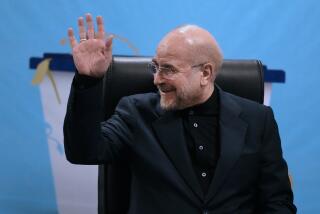Iran cleric calls for arrest of opposition leaders
- Share via
BEIRUT — A high-ranking Iranian conservative cleric called for the arrest of opposition leaders Friday and a counterpart demanded the release of political prisoners as Iran’s political and religious establishment showed no signs of reconciliation after the disputed June 12 reelection of President Mahmoud Ahmadinejad.
In addition, many lawmakers and clerics in Ahmadinejad’s conservative political camp fumed over his proposed Cabinet, including his decision to nominate three women. And an Argentine prosecutor confirmed that Ahmadinejad’s choice for defense minister, Ahmad Vahidi, is wanted by Interpol on terrorism charges.
Ayatollah Ahmad Jannati, head of the powerful ultraconservative Guardian Council, said the leaders behind recent antigovernment protests should be put on trial. His is the latest in a series of calls by hard-liners to arrest opposition figures such as Mir-Hossein Mousavi and Mehdi Karroubi, challengers in the presidential election who have since protested the results.
“During the recent riots, the entire nation was oppressed because the nation’s Basiji and Hezbollah children’s blood was spilled,” Jannati said, reiterating unproven claims that some armed militiamen who attacked and beat demonstrators during postelection demonstrations also were killed in the unrest. “Why haven’t the leaders of riots and those who everyone knows touched off the plots been arrested?”
Ahmadinejad and hard-line allies in the Revolutionary Guard and clergy have reportedly been pushing for the arrest of Mousavi, a former prime minister; Karroubi, a former parliament speaker; and other reformist leaders.
But reformists close to the security forces have warned that such a move would cross a “red line” that would trigger dire consequences. For now, the calls to arrest Mousavi and Karroubi appear to be attempts to silence them and their supporters, who continue to speak out.
Ayatollah Ebrahim Amini, prayer leader in the holy city of Qom, warned hard-line seminary students and clerics there to stop a campaign against an outspoken reformist cleric and called for freedom of “innocent” prisoners.
He told worshipers to stop their “obstinacy, willfulness and criminalization” of their critics.
“Such behaviors cannot help you preserve the system. You have to practice leniency, justice and compassion to preserve it,” he said.
Lawmakers ignored Ahmadinejad’s attempt to appeal directly to the people Thursday night in a televised interview meant to stave off a battle over his Cabinet.
“In my opinion, more than 50% of the proposed ministers won’t get a vote of confidence from parliament,” Ramazan Shojai-Kiasari, spokesman for the legislative body’s cultural commission, told the parliament’s official news service Friday.
Another conservative lawmaker, Ali Motahari, called the president’s proposed Cabinet “weak,” saying it failed to “measure up to the nation’s capabilities.”
A third, Hamid-Reza Katouzian, warned that the nation’s oil sector “will suffer irreparable damage” if Ahmadinejad’s pick for oil minister is approved.
Argentine prosecutor Alberto Nisman told Agence France-Press that Vahidi, the president’s nominee for defense minister, has been wanted since 2007 on charges stemming from the 1994 bombing of a Jewish community center in Buenos Aires that killed 85 people and wounded about 200. The Interpol warrant could make it difficult for Vahidi to travel abroad.
The nomination of three women for ministerial posts raised objections among Iran’s conservatives because of concern that the mixing of the sexes in official settings would violate Islamic principles.
“When a woman is named minister, she will be in direct contact with her male deputies, and Islamic principles will not be respected,” Ayatollah Yousef Tabatabai-Nejad told worshipers as he led Friday prayers in the city of Esfahan.
Mohammad Taqi Rahbar, head of a clerical bloc in parliament, told the Fardanews website that senior clerics had called on Ahmadinejad to reconsider his female picks.
Iran’s last female minister fled the country before the 1979 Islamic Revolution. A previous minister, Farrokhroo Parsa, was executed by firing squad in 1980 after she was sentenced to die on charges of being an enemy of God.
The controversy over the proposed female ministers suggests that Ahmadinejad, positioned between the protest movement, which regards him as an illegitimate usurper, and hard-line clerics and militiamen who want him to stick to his principles, has little political room to maneuver or expand his base of support.
--
More to Read
Sign up for Essential California
The most important California stories and recommendations in your inbox every morning.
You may occasionally receive promotional content from the Los Angeles Times.













